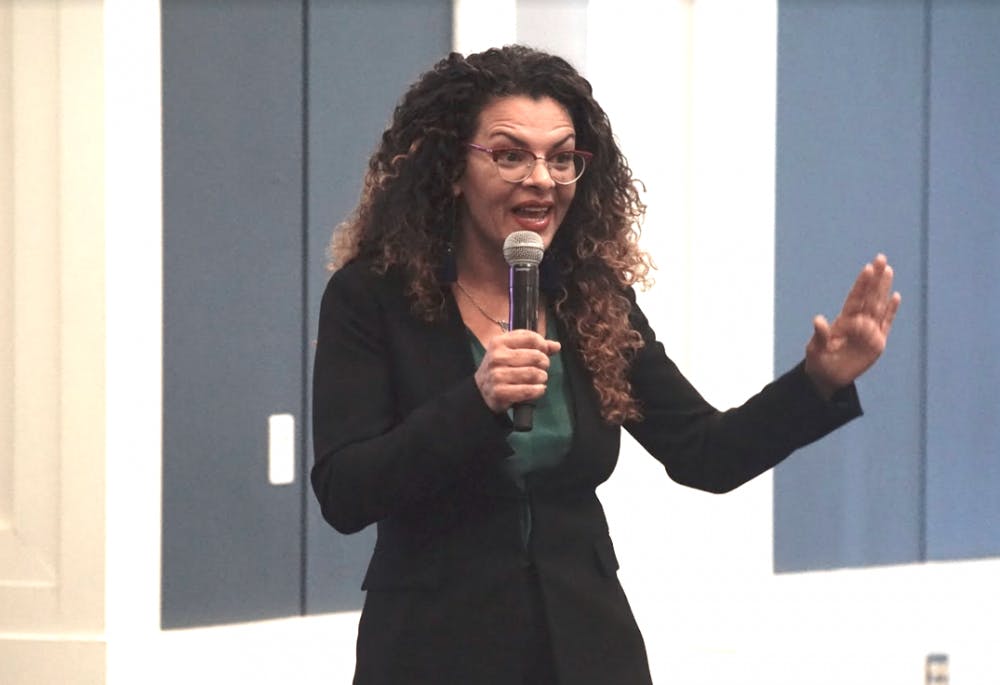By Kerry Hennessy
Correspondent
The College’s Educational Opportunity Fund program invited a college alumna to give a presentation titled, “Discovering Greatness: Inclusion and Social Change,” on Tuesday, Oct. 30 in the Education Building Room 212.
Silvia L. Mazzula (’98 and ’02) is an associate professor at John Jay College of Criminal Justice. During her talk, she taught students to embrace who they are — their greatness, their heritage and their future at the College.
“College, in so many ways, is a wonderful opportunity to find who you are,” Mazzula said. “Not that you’ve been lost. But to redefine, or reclaim who you are.”

Mazzula shared her experiences and the little moments that made her realize why her work was so important and how she rose above the obstacles life threw at her. She recognized how students from oppressed and marginalized backgrounds experience microaggressions on a daily basis.
According to Mazzula, microaggressions are the subtle comments and messages that go unnoticed and contribute to the new phase of racism and sexism. They are the most harmful experiences young adults of marginalized or oppressed backgrounds experience. She emphasized that these actions have damaging consequences.
“They seem harmless, but these comments indicate that they are outsiders, that they are different,” Mazzula said. “Not like the rest of us ‘normal’ people. And research shows, mine included that ... the trauma is real.”
During her time at the College, Mazzula’ found that she couldn’t rely on the current research that covered issues surrounding racism and marginalization. In the midst of her psychology internship at Rider University, she was seeing students who were coming to her with problems that weren’t in her textbooks.
These issues ranged from racism, discrimination, gender roles, social class conflicts, intersectionality and conflicts between their own perspectives versus the world views of their parents. She knew there was a hole for psychologists to explore and define.
Mazzula explained how she used the Least Intervention First Time method, a tiered approach to psychological care often applied to individuals with anxiety, depression or others looking to try and improve their well-being, to work with mental health patients.
“Their LIFT experiences were missing in the history of psychology and in understanding human healing and distress,” Mazzula said. “Completely missing.”
These missing answers lead Mazzula toward her passion for helping people who feel alienated. She claimed she didn’t realize it at the time, but her calling is to give voices to those unable to speak, either because they are silenced or because they are completely missing from society’s narrative.
“You don’t have to be invited to sit at the table,” she said. “You can create your table.”
Based on research, including her own, Mazzula showed that when people feel they belong, better solutions are made to any problems they encounter.
Mazzula used the topic of problem-solving to define excellence. Leaving college and going into the world, speaking up to change things for the better, she said, is an example of excellence. Her emphasis rejects the GPA that students weigh themselves so heavily on.
Through each drastically new step in her life, she felt that she was an imposter. Voicing her feelings of otherness during her childhood, high school years, time at the College, family gatherings after college and even in the first days of her doctoral studies at the University of Columbia, Mazzula remained optimistic.
Even after being told that she would fail every single class in graduate school, she found herself accepted to one of the greatest programs for race and gender studies.
“It becomes easier every time you step into something that is unknown or different,” Mazzula said. “You just have to have the courage to believe in you and your ability to figure things out.”
Jada Lamptey, a senior public health major, felt empowered after Mazzula’s lecture.
“I feel more inspired, or I guess more capable, despite my background,” Lamptey said.







